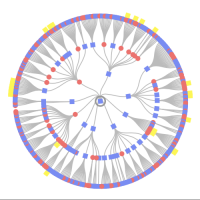Peerage Lines
My tree showed our family connected to a Laird and subsequently an Earl. All exciting. As I had time to review it I found someone had mistaken a Katherine Ross with a Catherine Ross. Easy enough. What they had done was not checked other linkages to support the connection, like the marriages of Catherine /Katherine Ross and children, and find source documents. The correct peerage line was Catherine, where and our line was Katherine. We were not related to the Laird or the Earl. Even the Earl had other children added which were not supported by peerage genealogies. May I suggest that in order to stop users freely being able to connect to peerage lines that such peerage lines be locked and managed by someone at FS. Any changes, connections, merging, etc, would need to pass through the Peerage Tree Custodian to be reviewed and approved. Otherwise, so many errors will creep in. ( In the same way that we don't want users connecting to famous people or celebrities.) We do want it to be a correct Tree. Question: Is locking peerage trees and having a custodian acting as the gatekeeper to those genealogies something FS may consider to protect the integrity of the Tree?
Best Answers
-
Hi Alan.
That is a great suggestion. Not too sure if/when it will be put into practice, however.
As an open database, Family Tree is also open to mis-matched records that are poorly researched and sourced. The only way this will succeed, is if everyone does work together, provides sources for their additions and collaborates with others to verify and prove before adding anything.
As mentioned in the Article attached, our hope is that through Family Tree, we can work together to create the best-sourced, public genealogical family tree in the world and allow family members to connect both in the past as well as the present.
In the meantime, we do the best we can in proving and sourcing the changes we make - as you seem to be doing. Thank you
But also, if you look to the left of this page, in the left hand column you will see 'Ideas' under the lightbulb icon. Click on it and you will then see a page that has several different groups where you can present your ideas for improving FS site and generally helping us make it more user friendly.
0 -
Errors like this are everywhere in Family Tree, even with families of no special standing. I find the collective process sorts it all out.
0 -
Thank you for your prompt responses and I appreciate that FS is a collective Tree and rather than have private trees with unsubstantiated tree linkages. It is preferable that the followers sort out what is correct rather than have FS get involved and take up the limited time of FS consultants.
However, when Peerage linkages already have a settled Tree that is beyond reasonable doubt and settled by an authority (e.g. Burke’s Peerage (burkespeerage.com)) Then to maintain the integrity of FS, any users wanting to link to a known Peerage Tree should provide and satisfy the Genealogical Proof Standard with sources that show either 1) Low - a preponderance of evidence 2) Middle - clear, cogent and convincing; or 3) High - beyond reasonable doubt. The Reason Statement should be made clear what is required to establish the authenticity of a linkage to a Peer and that it will be reviewed by someone (Peerage Tree Custodian ) who can verify its authenticity. Geni.com for example has Custodians, who protect any false errors in each Peerage Tree.
My suggestion is that only be done for those identified as Peers, eg. they have a Title or have been identified in Burke's Peerage; or The Scots Peerage by Sir Robert Douglas; or Main Page (thepeerage.com); etc. It will ensure the integrity of the FS Tree and poor research, even when unintentional. Thank you.
0 -
I think that if it were time to begin lignifying (or even petrifying) the tree, then the distribution of lignin should be fairly applied to all well-supported branches of the tree.
But that just moves Family Tree into the niche already occupied by Geni and Wikitree, and I find both of those projects far more odious than this one. Bureaucracy has a price, often a very high price.
0 -
I know from personal experience that "authorities" like Burke's are riddled with errors, ranging from simple typos to paragraphs of outright fiction. I don't think it'd be useful to "enforce" their contents on an online tree.
I don't know why people treat nobility or peerage (or fame and wealth) as if it were some sort of divine accolade that will spread to you if you can come up with a suitable connection to it, but it's a fact that people do, and that they are therefore motivated to become Highly Creative in their "research". This has been true since long before computers, and makes all genealogies involving the rich and famous at least somewhat suspect.
As dontiknowyou points out, both Geni and WikiTree are examples of collaborative-but-curated online trees. They use different models, each of which has its advantages and drawbacks. I think it's best if FamilySearch stays with its almost-fully-uncurated model, just as a contrast.
0
Answers
-
Thank you. I agree with your comment. I have also had persons on my Tree that have been added where the only source given is GEDCOM. For me, this is insufficient. If FS tries to stop people from being connected to Elvis Presley then the same should be done to some peerage lines without requiring the user to produce a Proof Statement that is reviewed. Any person who has a title should be able in FS to be identified. A database search with names that include Lord, Lady, Viscount, Duke, Baron, Earl, Prince, etc. Although Burkes gets updated it is protected by a qualified reviewer. I like FS because it seeks to create one correct tree compared to other sites. However, they do need to set some standards. Otherwise, it becomes a 'gibberish mess' as I try to sort out the lines on my Tree. Thank you again.
0 -
Actually, gibberish mess is where Family Tree begins, not where it ends. Much of the tree is still in the very early beginning stage.
0



